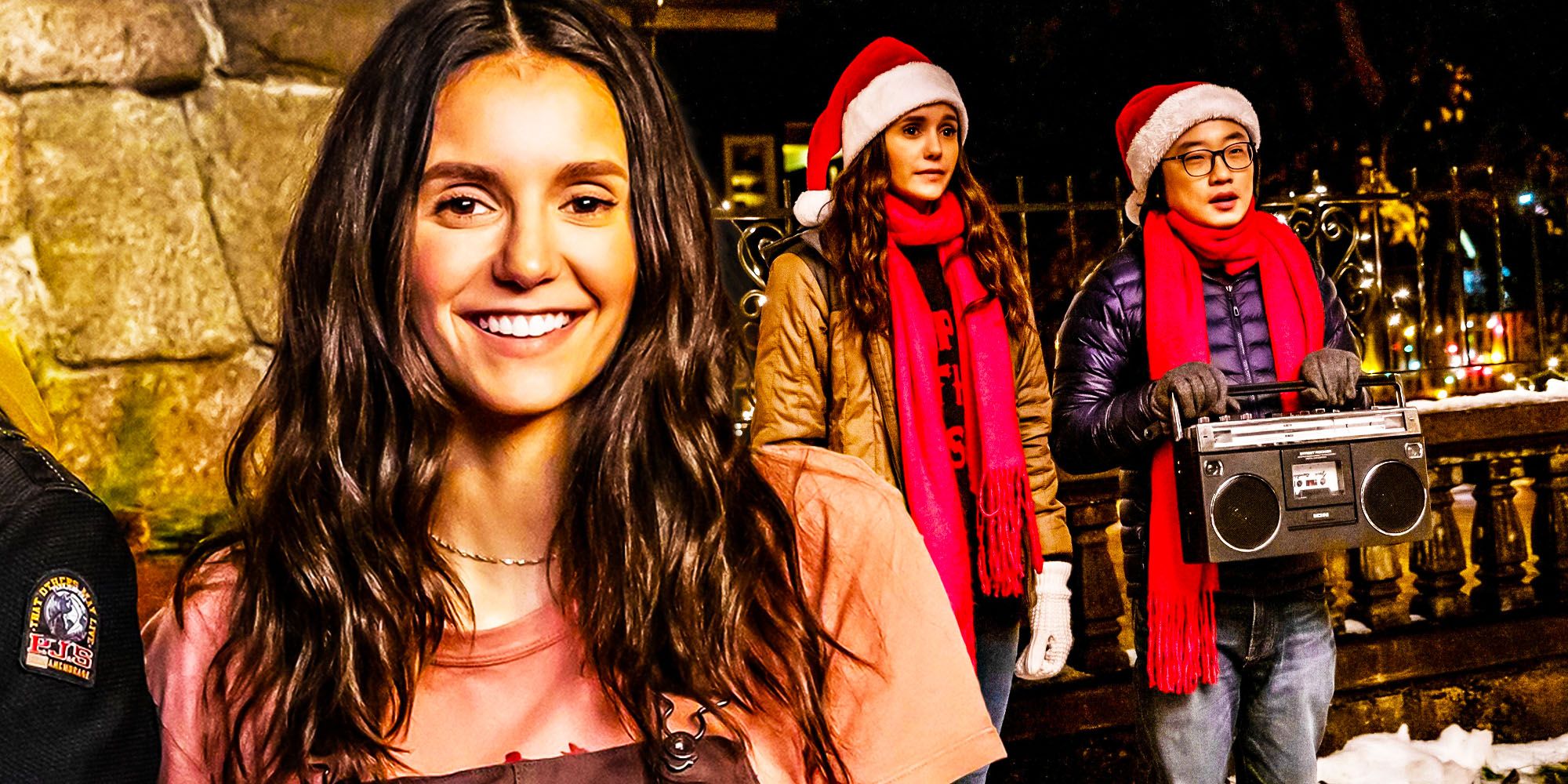At first glance, Netflix’s latest holiday rom-com Love Hard looks like another high-concept cinematic Christmas confection from the streaming service, but its ending proves that the romantic comedy has something more thoughtful to say about modern love. Love Hard is the latest in a string of festive rom-coms released by entertainment giant Netflix every Christmas. Casting The Vampire Diaries star Nina Dobrev as an unlucky-in-love columnist, Love Hard’s plot sees its heroine cross the country to surprise her online boyfriend for the holiday season, only to discover she’s been catfished by the movie's scrappy antihero Josh (played by Jimmy O. Yang).
While many people would immediately return home when faced with a romantic disappointment of this magnitude, the intrepid Natalie opts instead to enter into a devil’s bargain with the duplicitous Josh. As Josh’s friend Tag (the man Natalie thought she had been messaging) is also a local of the same small town, Natalie offers to pose as Josh’s girlfriend for the Christmas period and impress his family. In exchange, Josh can repay this favor and make up for his catfishing antics by setting Natalie up with Tag.
However, much like the plot of 2021’s fellow Netflix hit Intrusion, Love Hard's story things soon grow more complicated for the cast as deceptions, double-crosses, and assorted schemes begin to pile up. Before Love Hard’s ending, Natalie has catfished Tag by pretending to be an outdoors sports enthusiast, Josh has lied to his parents about his future career plans as well as his romantic status, Natalie’s boss Lee has tracked her down to the small town, and Josh’s brother has begun to smell a rat but failed to piece together the entire mystery. The many subplots of Love Hard converge in an ending that is both predictable and surprisingly subversive for a holiday rom-com.
What Happens In Love Hard’s Ending
Unlike Netflix’s fellow catfish-themed hit Clickbait, the ending of Love Hard doesn’t hinge on a huge, unlikely twist. Instead, the outcome feels inevitable as Josh’s family throws a surprise party for the seemingly happy couple with Tag in attendance, and Natalie gives a speech that explains the entire convoluted scheme to the assembled partygoers. Tag leaves in disgust, noting that the false personality Natalie presented to him is no different from Josh’s catfishing of her. Lee commiserates with the glum heroine as a confrontation between Josh and his father surprisingly ends with the patriarch approving of his son's secret desire to set up a business selling candles. It is this revelation that prompts Love Hard’s happy ending. As Josh realizes he should never have hidden his ambitions from his father, Natalie simultaneously realizes her dating misfortunes were caused by presenting a false version of herself to her suitors. In a Love Actually/Die Hard-referencing romantic gesture, Natalie reunites with Josh, and the pair share a kiss before being welcomed into his family.
What Became Of Tag, Love Hard’s Other Love Interest?
Love Hard's ending sees Natalie and Josh end up together but fails to answer the lingering question of what fate awaits her second string love interest, Tag. Canonically, Love Hard depicts Tag as little more than a likable, if largely uninteresting, sports enthusiast. As such, viewers can be assured that the character’s easygoing attitude, his popular hobby, the fact that Natalie was attracted to him in the first place, and his strong feelings about honesty will likely ensure Tag a happy ending in the world of Love Hard. Love Hard’s occasionally barbed dialogue and amoral attitude toward catfishing make the rom-com more of an edgy, Sex & The City-style critique of modern dating culture than, say, The Knight Before Christmas. However, in the heel of the hunt, Love Hard is ultimately a gentle, sweet, and heartwarming Christmas movie, meaning Tag’s unflappable morals will likely be rewarded in his offscreen future.
What Will Become Of Natalie’s Column?
One important issue left unexplained by Love Hard’s ending is the question of what will happen to Natalie’s column now that she has found romantic fulfillment. The dating disasters column that the heroine authors appears to be her only source of income and outlet for professional ambition, meaning her sudden discovery of a happily ever after could come at a substantial cost to her bottom line. Of course, this may be the point of Love Hard’s ending. Much like Sex & the City’s heroine eventually abandoned perpetual singledom in favor of a happy ending despite the cost this had to her writing career, Love Hard's Natalie makes the tough decision to imperil her livelihood by pursuing Josh. The very fact that her next paycheque hinges on her dating life remaining a failure proves that her and Josh’s love can transcend such an existential concern, and it is this enduring faith in their partnership (and in herself) that prove Natalie has found true happiness in Love Hard’s ending.
What Love Hard’s Ending Really Means
Fans of Christmas rom-coms will not be surprised to see Love Hard’s ending cribs from a famous moment found in the 2003 rom-com Love Actually. That earlier festive rom-com has had an outsized influence on the genre since its release, and so it adds up that Love Hard would include a nod to one of its most famous moments. However, the scene in question does more than merely offer an homage to Love Actually and can be seen to betray the true meaning of Love Hard’s ending. While Natalie uses the infamous cue card romantic gesture from Love Actually to express her love for Josh, Josh returns the favor via an un-re-printable quote from Die Hard. This is a callback to a debate earlier in Love Hard over whether Die Hard is a Christmas movie, but the sight of the duo exchanging movie quotes to show their love has a deeper meaning.
Like the hit sci-fi horror What Lies Below, Love Hard is a movie obsessed with the disparity between how people present themselves to the outside world and their true identities. Both Natalie and Josh are dishonest to their potential paramours, family, and employers precisely because they are dishonest to themselves, striving to be a perfect version of themselves that doesn’t exist. By referencing famous movies to express their love for one another, Natalie and Josh accept that even the most insincere mediums can be the vector of a sincere message. By extension, the two antiheroes accept that even the most deceitful of circumstances, i.e., catfishing, can paradoxically result in the most authentic of outcomes, in this case, Natalie and Josh’s true love for each other. Thus, Love Hard’s ending challenges the idea of “authenticity” in an era when a culture capable of endless replication has arguably cheapened sincere expression and urges viewers to search for honesty in even the most ironically mendacious places.





